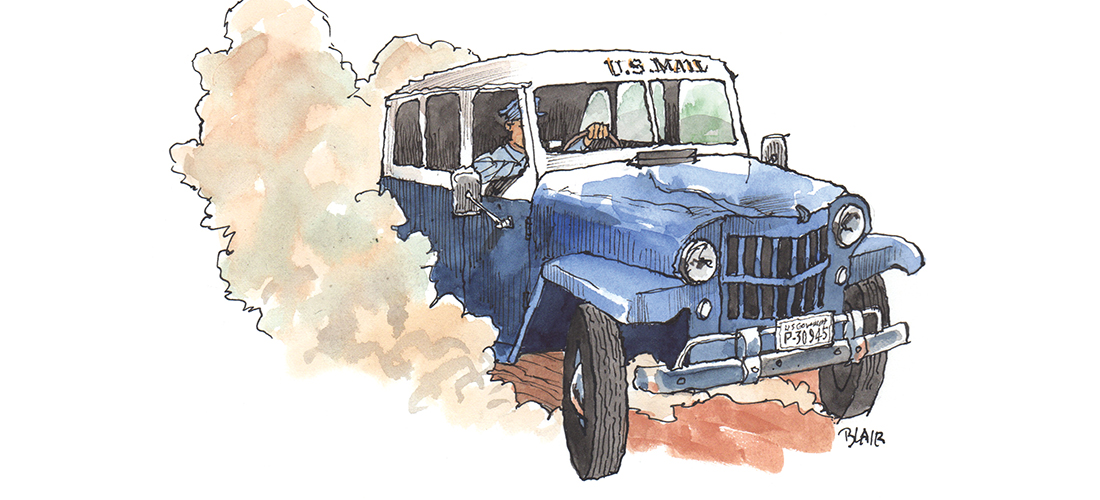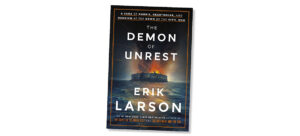
Don’t Forget to Write
For our family, the mailman was more than just a welcome sight — he was a lifeline
By Ruth Moose
As a child during World War II, I lived with my grandparents on a farm near Cottonville in Stanly County, North Carolina. With gas rationing, there was no traffic and so quiet we could hear the mailman long before we could see the cloud of dust his car made on the unpaved road. In a world turned upside down and torn apart, mail was the only thing we could count on.
We lived for the mail. It meant the world to us. We had the radio and a weekly newspaper, also delivered by the mailman. But letters told us the people we loved were safe. At least for the time being. My grandparents’ four children were in four corners of the world: my father stationed in France; my Uncle Tom a navigator with the Army Air Corps in London; my Aunt Pearl, an Army nurse, was with MacArthur’s troops in the Philippines; and my Uncle Edgar, who had just graduated from UNC-Chapel Hill with a masters in physics was in Washington, D.C., and alternately, Oak Ridge, Tennessee. Each of them wrote a letter home every week. You could depend on it. And my grandparents wrote back.
When two weeks went by without a letter from her daughter, my grandmother was more than worried, fearing the worst. She sent inquiries. Discovered my aunt was in this country, hospitalized with a mental and physical breakdown. But she was alive and recovered.
The mail not only brought letters each week but also a brand new, fresh copy of my grandmother’s favorite reading, The Saturday Evening Post. That was her recreation, her relaxation, her reward at the end of each long, worried day. On special occasions the mailman might bring a box of Whitman’s Sampler, picked up from a PX somewhere I’m sure. We rationed a single chocolate a day as long as it lasted.
The mailman also brought books! My aunt in D.C. was a librarian and regularly mailed me books, books that were read aloud to me until I taught myself to read. Poems from A Child’s Garden of Verses, The Adventures of Peter Rabbit and others. Books were magic doors to a larger world and gave me a lifelong love of the printed word, of learning, of no greater pleasure than reading.
When the war was over, they all came home, wounded in body, mind and spirit, but thankfully alive. They continued the weekly letters home and to each other the rest of their lives.
After my grandfather died, the farm was sold and my grandmother lived three months at a time with her four children: my aunt a school nurse in New Jersey; my uncle on the faculty at N.C. State in Raleigh; Uncle Edgar teaching at Georgia State; and my family in Albemarle. Always letters back and forth, specialty cards for all the occasions. Cards to be kept and displayed on mantels and dressers. Cards to be re-enjoyed for days and weeks following. Not the same as today’s emails, a blink here and gone forever. I remember getting an e-condolence card after my husband’s death and crying in frustration. If the sender really wanted to send some sympathy, they could have bought a card, or written a note, signed, addressed, stamped and mailed it. An e-condolence was a quick click and no more thought than that. Obligation over.
Sadly none of the old letters survived. Tossed in the purging of estates after a death; nieces, nephews, cousins, grandchildren who saw them as only pieces of paper, not family history.
During the pandemic, I’ve being purging files, boxes from storage and attics. Deep in one box I was amazed to find my letters to my husband, who was then my boyfriend during our four college years. He had somehow, somewhere, kept them and they had survived many moves, packing and unpacking. Don’t tell me emails could do that. Not in a million years. Yellowed and with three-cent stamps, the letters tell the story of a summer romance that lasted over 50 years. I’ve been reading, alternately laughing and crying. We were so young. So 1950s crazy and scared. The question is: Will my sons want these letters? My grandchildren? I can only hope. PS
Ruth Moose taught Introduction to Writing Short Fiction at UNC-Chapel Hill for 15 years. Her students have since published New York Times Bestsellers and are getting Netflixed. She recently returned to her roots in the Uwharrie Mountains.





